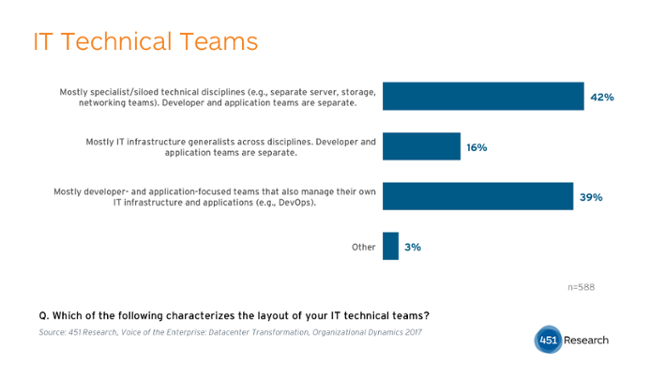Software-defined technologies continue to alter the composition not only of datacenters and the IT infrastructure within them, but also of IT teams that manage these entities. As IT management platforms perpetually expand their purview to oversee a larger piece of the overall infrastructure environment, we find that the IT personnel tasked with using these platforms tend to have a broader range of IT knowledge and capabilities.
In our latest 451 Alliance Datacenter Transformation, Organizational Dynamics research, we found that 41.5% of organizations now say their IT technical teams are composed mostly of specialist/siloed roles, followed by 39.3% that said they have mostly IT infrastructure generalists across disciplines. The gap between these two is far less pronounced than what we saw in 2016, when 51.6% of respondents said they had mostly specialists, vs. just 34.1% with mostly generalists.

Although the current trend appears to favor IT generalists, this by no means indicates future elimination of specialist roles in today’s ecosystems. In fact, in large organizations, specialists play key roles to ensure the necessary skills are in place to accommodate a wider range of systems, applications and programming languages. We’ve also found larger organizations tend to have decentralized budgets more often than smaller organizations, which can further support the need for specialists to oversee IT projects that are specific to lines of business, departments or projects.
“What we want from [potential employees] is that they are capable of managing with very limited resources and very limited number of roads. For instance, let’s say on the database level, you need somebody who knows about many databases, not somebody who knows Oracle into the greatest detail. But also, somebody who knows and understands how the database is playing a role in a complex application, multi-tier application, how to make Oracle resilient, how to make any database resilient. And then, for instance, be able to switch from working with Oracle to working with inter-systems cache but all on the databases.”
->10,000 employees, $5bn-$9.99bn, Healthcare, Mid-Level Management
The eventual realization of the software-defined datacenter will no doubt change the personnel landscape of future IT teams. We don’t believe this technological evolution presents an outright threat to traditional IT roles, but there is already a rising sense that people in some positions, such as server administrator and storage administrator, should take advantage of internal, company-led training when it becomes available. We’ve already seen many organizations offering training that expands the capabilities of their IT teams and allows once-siloed personnel to better grasp and manage IT infrastructure outside of their traditional comfort zone.

